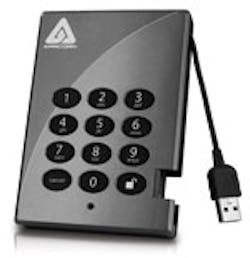Two New Drives Feature Data Protection That's Easy To Use
Aegis Padlock hard drive from Apricorn
If you’re hankering to protect your data, but don’t want the fuss and bother that sometimes goes along with it, two new products can help you on this front. One is the Aegis Padlock hard drive from Apricorn and the other is the DataGuardian USB 2.0 flash drive from SuperTalent. The Aegis Padlock that I looked at is a 750 Gbyte hard drive with a 3.3” x 4.7” x .75” form factor. The USB cable cleverly tucks into the side of the drive so that the drive can fit into a travel pouch provided with the drive. The pouch is made of a foam-like material to protect the drive during transport. The cable is only about 4” long, but a Y-auxiliary cable is included, if needed. Why a Y cable? One part of the cable is just a typical USB extension cable, while the other part can draw additional power through a second USB port, if needed. Actually, I had never seen this type of cable before. I didn’t need the power part of the cable on my desktop PC, but I suppose some portable PCs might need it.
The drive actually has the look of a calculator sans display with a 12-key keypad on the top of the drive. Herein lays the simplicity of the protection. Like a hotel room safe, you simply program a numeric code into the drive. There is a default code of 123456 to get you going with the drive, but a Quick Start Guide shows you how to program the drive with your own 6-16 number pin. It took me a few tries to do this, probably because I didn’t adhere to the timing of the programming sequence at first.
Once you’ve programmed the drive with your own code, using it is simply a matter of plugging it in to a USB port and entering the code number. If you forget the number, you’re essentially out of luck, but that’s often the price you pay whenever you try to protect data with a passcode.
The drive does not require any additional software, so it’s a great choice for office environments with IT departments that control software installations. It works with Windows, Mac and Linux computers, though it comes preformatted in NTSF for Windows.
What happens if someone steals your drive, removes it from the case and plugs it in into his own computer? He would have to break the AES-128 or 256-bit hardware encryption on the drive to view your data. The Aegis Padlock uses one or the other encryption schemes—depending on the model—to encrypt all data on the drive in real time.
In addition to encryption, Apricorn has really thought through the possible attack scenarios and implemented ways to guard against them. The first is the brute force attack. The Aegis Padlock uses a three-pronged approach to guard against this. The drive denies access to the data until it can verify the user pin number. After several incorrect attempts, the drive locks itself, requiring the user to plug it in again to input a pin. This feature blocks automated attempts to enter pin numbers. After 100 failed pin entries, the Padlock assumes it is being attacked and will destroy the encryption key and lock itself, rendering the data useless and requiring a total reset to redeploy the Padlock.
Protection against hacker attempts doesn’t stop with protection against brute force attacks. Incorporated into the drive’s electronics is Apricorn’s Variable Time Circuit (VTC) technology, which works to thwart “timing attacks” aimed at accessing the drive by studying the behavior of the Padlock’s electronics and infiltrating them.
Finally, the key pad on the Padlock is wear resistant. Designed with protection in mind, this wear-resistant feature essentially gives no indication of key usage and thus avoids tipping off a potential hacker to the commonly used keys.
Since users will probably carry around this drive, the Padlock’s design features a 16-point omni-directional shock mounting system, protecting the drive from drops and knocks. There’s also the foam-like pouch, as mentioned, for additional protection against bumps and bruises. Another feature is the ability for administrators to add up to 10 passkeys for use by other members of a team.
If you’re looking for an easy way to protect sensitive data, the Aegis Padlock hard drive is an excellent choice. Prices range from $89 for a 250-Gbyte drive with AES-128-bit encryption to $199 for a 750-Gbyte drive with AES-256-bit encryption. Drives can be ordered direct from the Apricorn web site at www.apricorn.com.
A USB Stick With Protection
If you’re more interested in a USB flash drive with built-in password protection, SuperTalent recently announced the DataGuardian line of 4-, 8-, and 16-Gbyte USB 2.0 flash drives. I didn’t actually get to use one of these drives, but from what I can tell, it’s fairly simple to use. All you have to do is plug in the DataGuardian, and an application automatically launches from the drive’s firmware. You simply enter your password to access your data. When you unplug the drive, it is secure again.
The DataGuardian also blocks all auto-run based malware attacks. The company says that this kind of malware propagation technique has become the number one distribution method recently for virus attacks targeted at USB flash drives.
If you want to see how the drive works, check out the video at www.youtube.com/user/gosupertalent?feature=mhum#p/u/12/dovb_rInChw. Suggested retail prices for the drives start at $12.50 for the 4-GByte drive and range to $39.99 for the 16-Gbyte drive. The drives are available from sites such as www.amazon.com and www.superbiiz.com.
